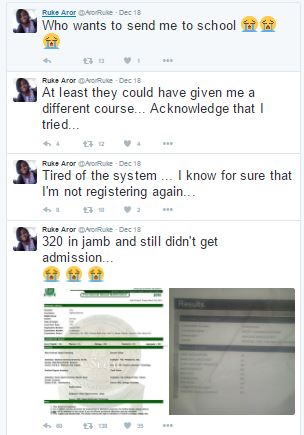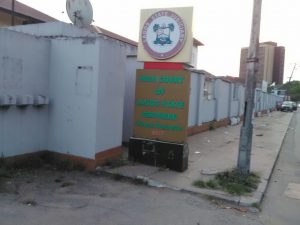
‘bilingual education’ refers to the use of two or more languages as mediums of instruction for ‘content’ subjects such as science or history.
– Cambridge International Examinations (PDF)
According to a recent report in the Premium Times (an online Nigerian newspaper), it was reported that the Minister of Science and Technology, Ogbonnaya Onu said primary and secondary schools in the country will soon start teaching Mathematics and Science subjects in indigenous languages. The Minister was reported to have said this at the inauguration of inter-ministerial committee on teaching of mathematics and science subjects in local languages in Abuja. The inter-ministerial committee involved Federal Ministry of Science and Technology and the Ministry of Education.
Much of the debate on bilingual education is politically motivated, more suitable for talk show than for improving schools.
– Maria Estela Brisk in Bilingual Education: From Compensatory to Quality Schooling
To start with, I’m of the strong opinion that a bilingual approach to learning looks like a compelling and progressive approach to educate children in Nigeria. However, this approach should not be carried out in a manner that is based on assumptions, impulses or perceptions. There are many dangers in such an approach and that is why I strongly oppose the ‘headline grabbing’ statement by the Honourable Minister.
In some of my previous posts I had suggested the need to provide a safe space for the use of native Nigerian languages as mediums of not just social interactions but for use in the education system from the early years up to the higher education levels and you can read some of my views on the issue here, here and here.
I’m aware of the inability of Nigeria as an entity to have one of its numerous local languages as the main national language and I used the metaphor of the Nigerian parrot and the dilemma it presents its seller in the parrot business market in Nigeria, because with about 520 native languages in Nigeria, which language would you teach the parrot with the hope that the seller will be able to sell the parrot within a very short period of time and enjoy the high business turnover that every successful business craves for?
The fundamental issue with the Minister’s proposal is that it is like the case of “an empty vessel that makes the loudest noise“. The statement remains a statement until it becomes a policy by going through the right process. However, how realistic or enforceable will this policy statement by the Minister be?
In education, there is the argument by some educationists and education researchers that education policies should be evidence based and not just ideological or albeit in the case of Nigeria, impulse based. The assumption by the Honourable Minister that, for there to be advancement in science and technology in the country, there’s need for children to be taught in the native Nigerian languages only panders to sentiments, emotions and not necessarily evidence.
The use of multiple languages in education may be attributed to, or be a reflection of, numerous factors such as the linguistic heterogeneity of a country or region (e.g. Luxembourg or Singapore); specific social or religious attitudes (e.g. the addition of Sanskrit to mark Hinduism or Pali to mark Buddhism); or the desire to promote national identity (e.g. in India, Nigeria, The Philippines).
– Cenoz & Genesee (Ed. Beyond Bilingualism: Multilingualism and Multilingual Education)
To decide to implement such a policy, the government needs to look at other nations that are practising bilingual education and study the challenges they are facing and also, Nigeria needs to look at its own past attempts at implementing bilingual education and learn from the mistakes of the pasts and also understand some of the core issues that such an approach to providing education created in the Nigerian education system.
There is need to explore the nature of disadvantages a bilingual education could create amongst a particular group of people or a particular language, based on the structure of such a language. Also, there is the cost implication of trying to implement such an education system. Does Nigeria as a country have the teachers who can deliver a successful bilingual education? How prepared and ready are the colleges of education and universities’ faculties of education in Nigeria in training bilingual ready teachers and educators? What are the available teaching and learning resources for such an education system in the country? How acceptable is the policy to an average parent in Nigeria? Would the system leads to making children from poorer backgrounds to be in more disadvantaged positions in later life compared to their contemporaries who would probably have attended fees paying private schools and have access to better resources in terms of teaching and learning resources and more often than not better motivated teaching staff? What disparity would the level of children with bilingual education in terms of their ability to communicate effectively in English language have on their life’s chances, particularly in a country like Nigeria in which grammar is over emphasised over and above the context and content of what is being discussed?
The school, next to home, is the major socializing agency. The individual child learns those behaviours, values, and norms espoused by the home and the school; when such are congruent, there is no conflict. But when the cultural traditions and priorities of the home differ from those of the dominant culture, the school’s goals – those of the majority – become imposed in a resocializing process.
– Cross, Baker & Stiles (Ed. Teaching in a Multicultural Society: Perspectives and Professional Strategies)
Another fundamental issue is the definition of ‘what a bilingual education will look like in a country with about 520 languages?’ If the system is such that some of the main Nigerian languages like: Hausa, Igbo, Yoruba, Ibibio, Efik and Fulfude amongst many others will be considered as the “native languages of educating children in the country”, then what will happen to the other native languages that are major to their native speakers but do not have enough political strength to flex their muscles as major Nigerian languages? Will it be another case of “language imperialism or hegemony” by the other major native Nigerian languages? What will be the financial implications of having to publish multiple textbooks in multiple native Nigerian languages along with English language and at a generally acceptable standard by the main examination bodies in the country? Do the main examination bodies in Nigeria have the requisite know-how and personnel to conduct successful bilingual examinations? How will the system attend to the needs of people living in areas in which they’re considered ‘minorities’ and as such the education delivered to them will be in another language that is not native to them? Will the government be willing to fund the bills of translating international research journal articles and other research materials into native Nigerian languages for the benefits of those that will be bilingually educated?
For me, there are many questions that need answers and also, there are many issues that demand both short term and longitudinal research strategies in understanding the dynamism that a bilingual education policy will bring to the Nigerian education landscape.
In both bi- and multilingual education more than one language is used as the medium of instruction, but multilingual education can present additional challenges because it is more ambitious. By multilingual education, we mean educational programmes that use languages other than the first languages as media of instruction (although some teach additional languages as school subjects) and they aim for communicative proficiency in more than two languages. Accomplishing this calls for complex educational planning in order to accommodate multiple linguistic aims, curricular materials, and teaching strategies within the framework of limited school schedules. Multilingual education, like bilingual education, can take different forms because it is necessarily linked to the sociolinguistic context in which it takes place and has to take into account the relative status and use of the languages involved.
– Cenoz & Genesee (Ed. Beyond Bilingualism: Multilingualism and Multilingual Education)
Finally, whenever the Nigerian government is talking about education in “mother tongue or native Nigerian language”, perhaps it will be better to say “education in mother tongues or native Nigerian languages”, because the case for bilingual education in Nigeria is actually a case of multilingual education. Remember the metaphor of “what language would you teach the Nigerian parrot?”.
Please, leave your thoughts on this post in the comment section and feel free to share the article with your contacts. Thanks for taking out of your precious time to read my article/s!
If you like this post, kindly subscribe and/or follow me on Twitter @otukogbe and @EdusoundsNg or on Facebook at edusoundsng.




